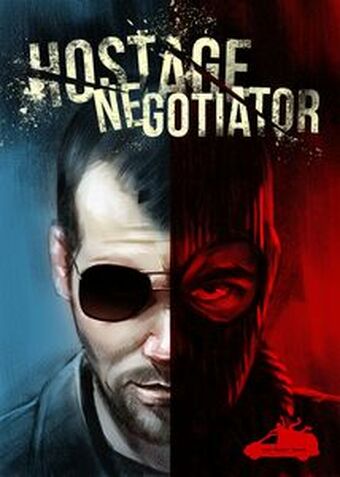 What is this game about? Hostage Negotiator is exactly what it sounds like: Hostages have been taken, and it's up to you to talk down the abductor and release innocent people. If you free half of the hostages and capture or kill the abductor, you win the game. Otherwise, you lose. And Hostage Negotiator is truly set up to feel like an attempt to speak with an unstable person. Each round begins with a "conversation," where you play conversation cards in an attempt to advance your interests. You start with a hand of free conversation cards, but earning "conversation points" can allow you to purchase better ones with different abilities. Will you attempt to pull off a "minor extraction" and break out some hostages? Will you sweet talk the abductor to suss out his or her demands, or to help maintain calm? At various moments in the game, you can even choose to concede one or more demands—a decision that comes with immediate rewards, but potentially awful long-term consequences. After you play your conversation cards and purchase new ones, you will also resolve a "terror phase" in which the abductor inevitably does something terrible. All of your successes and failures are determined by a roll of the dice. If your abductor is calmer, you can roll more dice and have a greater chance of success. The more agitated your abductor becomes, the fewer dice you get to roll—and failure can lead to further escalation and even the death of hostages. This is a high-tension game, and even the best-laid plans can go awry. How does it play solo? Hostage Negotiator is solo-only, which means it is custom-made just for us solo gamers! 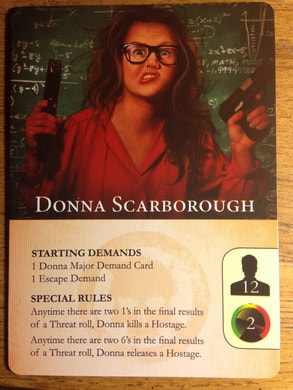 Donna Scarborough is my forever favorite abductor. Donna Scarborough is my forever favorite abductor. Overall Thoughts I love Hostage Negotiator and have for a while. I wrote positively about it back in 2016, before I had nailed down a consistent review format, and if anything, I like it better now than I did back then. Even though I've had this game for years, it's still one that I pull out for a quick play, and it will never leave my collection. It is absolutely true that Hostage Negotiator can be a luck fest. Sometimes you will lose because the dice hate you, and that's just the way it is. But for me, that is just part of what Hostage Negotiator does best, which is tell an excellent story. Of course your plans won't always work—this is a game about trying to negotiate with someone who is not acting rationally. Hostage Negotiator gets better the more you give yourself over to your imagination. I love inventing dialogue for myself as I play, and each abductor comes with a backstory that gives him or her motivation and makes the gameplay more immersive. As you play more, you will also discover that while there is some luck involved, there are clever card combinations you can build to mitigate your luck and increase your odds of success. What delights me the most about Hostage Negotiator, especially now that I've owned it for a long time, is the variety among abductors. In addition to the base game, there are several "abductor packs" you can pick up that contain new backstories, new terror and demand cards, and new tales you can tell yourself while you play. Probably the most boring abductor in the whole series is the starter one, Arkayne Massua, who is just a generic "terrorist" type. Beyond him, you get a number of abductors, some of whom are cold-blooded criminals, but others of whom are more sympathetic—one even causes the hostages to develop Stockholm Syndrome! I should say, in case it isn't obvious, that Hostage Negotiator has a brutal theme. Hostages die. Sometimes you really mess up, and they all die. And in some cases, those hostages are even more young and innocent than you'd expect. My favorite abductor to this day is Donna Scarborough, a disaffected teacher who takes her class hostage. Dealing with her is dark, especially because I'm a teacher myself—and because it's not 100% clear whether Donna is a college professor or going for tenure in a secondary school system. I find this darkly amusing, because this is all an imaginative exercise. But if that's not your style, I really can't blame you. Do I recommend it? Definitely. If you're a solo gamer, you should absolutely give Hostage Negotiator a try. I consider it a "solo classic" that should be in any collection. Overall Rating: 5 stars Rating Scale: 5 stars — I love it! 4 stars — I really like it. 3 stars — I like it. 2 stars — It's okay. 1 star — Meh.
2 Comments
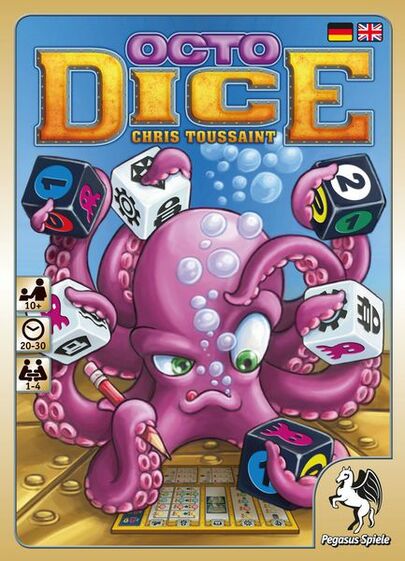 What is this game about? OctoDice is a light roll and write game based on Aquasphere. You'll be rolling and combining dice to take actions and earn "knowledge points." The goal is, of course, to earn the most knowledge points! The challenge of the game is deciding which dice to keep and then how to combine them. You initially roll six dice on your turn, but you can only keep two each time you roll. So you keep two dice and reroll four, then keep two of those dice and reroll two. Then you just have to work with what you've got by combining the dice and choosing actions wisely. The actions you can take are varied—you can build robots, do research, and analyze crystals, all of which will earn you points. You can also take some actions that don't necessarily earn you points, but which can help you in the future. If you build submarines, you can get extra bonus points for your robots during each of three intermediate scoring phases. Additionally, it's possible throughout the game to upgrade your lab to get more flexibility with your dice or better scoring bonuses. Aside from your regular actions, you will also roll "octopods," and unless you keep a certain amount of them, you can take point penalties during intermediate scoring rounds. Sometimes you just get a single, useless octopod that is only good for preventing trouble down the line. If you get multiples on a single turn, however, you can actually get a sweet scoring bonus. How does it play solo? OctoDice has a beat-your-own-score solo mode that is just a little different from the multiplayer game. In multiplayer OctoDice, it pays to pay attention to your opponents' rolls, because players can take actions using the opponent's dice. Because that is not possible in solo, you just take extra turns to account for those extra actions you could have taken in a multiplayer game. 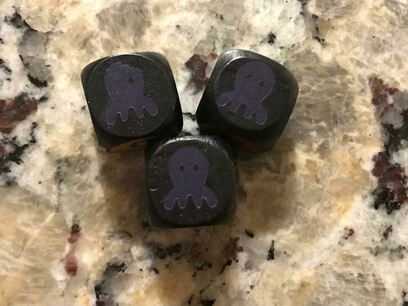 The little guy on the top left is having a rough day. :( The little guy on the top left is having a rough day. :( Overall Thoughts OctoDice is a decent filler. I like the combination of luck of the dice and the decisions you have to make about which dice to keep each time you reroll. Making smart choices early can lead to increasing dividends down the line, especially where technology and submarine construction are concerned. That said, OctoDIce is just okay. It may be too light—I generally prefer roll and writes with a bit more buildup, that give you a sense of growth and progress throughout. I also prefer dice games without completely dead turns, which can happen in OctoDice. Remember how I said it pays to make smart choices early? That's if the dice give you an opportunity to make those choices. There are also some issues with the components. My dice were chipped and flaked right out of the box, and some of the octopods look very blotchy. OctoDice is entertaining, but it doesn't quite come together in a package that will keep me coming back for more. Do I recommend it? If you absolutely love roll and writes, then you'll probably enjoy OctoDice. But it's not my favorite roll and write. Overall Score: 3 stars Rating Scale: 5 stars — I love it! 4 stars — I really like it. 3 stars — I like it. 2 stars — It's okay. 1 star — Meh. 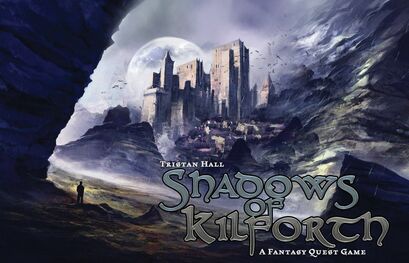 Kickstarter is a tempting place for solo gamers with money to burn. Alas, I am not one of those right now, but I can still dream! Here are some very pretty-looking projects on Kickstarter right now. 1. Shadows of Kilforth This game looks great—gorgeous art, awesome fantasy setting, great track record. If you liked Gloom of Kilforth, this will probably be up your alley. If you are ready to break into the world of Kilforth, then Shadows could also be a good entry point. I personally love fantasy card games, so I am definitely interested. It looks like Shadows of Kilforth has cool race/class combos, fun abilities to try, and cool locations to explore. However, I backed Gloom of Kilforth last year and haven't received it yet, so I'm trying to exercise some restraint. 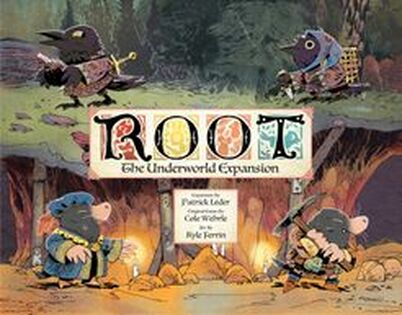 2. Root: The Underworld Expansion Root continues to take the gaming world by storm, and deservedly so—it's an interesting game with great art. This expansion will add moles and crows... but it will also come with an add-on that includes more solo bots. I'm interested to see how these play, especially since right now Root offers a great multiplayer game but a solo experience that is shallow. Is that about to change? I don't love the idea of a solo add-on, but I do have faith in the potential of solo bots. I enjoy them in full-on COIN games, so I don't see why there can't be good ones for Root. That said, is it worth the money? For multiplayer, I'd say yes. For solo only? I'm still on the fence. 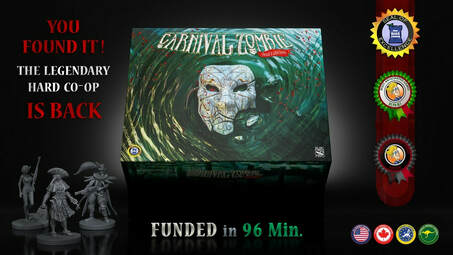 3. Carnival Zombie This game looks wild! (In a good way.) You are in Venice for a vacation during Carnival... but then everything goes wrong, the apocalypse happens, and zombies attack. At night, you need to escape the ravenous hordes. During the day, you need to rest up, gather resources, and plot your escape from the city. Even better, the characters all still have their costumes on, so they are gun-totin' heroes bedecked with ribbons and crazy masks. Consider me interested. 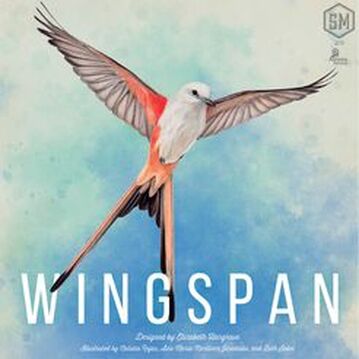 What is this game about? Wingspan is an engine-building game designed by Elizabeth Hargrave and published by Stonemaier Games. Your goal in the game is to build up the best possible aviary, symbolized by accumulating the most victory points. There are only four main actions to take, and you can take only one action per turn: play a bird card, collect food, lay eggs, or draw new bird cards. However, your choices intensify as the turns go by. When you place bird cards on your player board, you block off weaker action spaces and gain access to more powerful ones. You also have a chance to activate bird powers for each card placed in a given action row. To keep the game tight as your powers grow, you lose an action after each of the Wingspan's four rounds—in other words, late in the game, each individual action can accomplish more because you've built up your engine, but you can take fewer of them. When it comes to end-of-game scoring, there are multiple ways to earn points. These include straight-up points earned through bird cards, points earned through pursuing various goals on the end-of-round scoring track, eggs accumulated, food cached on certain bird cards, and cards that are tucked under other cards during play. Each player also gets a unique scoring goal that can contribute to their point total when the game is finished. This leaves room for multiple strategies that players can try. How does it play solo? As we can now expect from Stonemaier games, Wingspan comes with an Automa—an automated opponent specifically designed for solo play. The Automa deck for this game is smooth and efficient, with very low upkeep. Each turn, you draw a card for the Automa that determines what action it takes—and that allows it to accumulate points. The Automa gathers steam very quickly, so whatever it does will push you to maximize your own performance. I also appreciated that the Automa does allow you to trigger the same powers that you normally would in a multiplayer game, so you don't feel like any of your card powers are wasted. 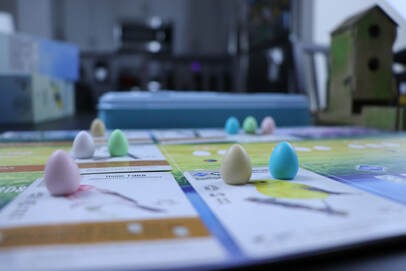 Overall Thoughts Wingspan is very enjoyable to play. I love the tension of trying to choose which actions to take and which birds to place. It's tough to decide which action rows you should prioritize. If you focus too much on card draw, you may not be able to generate the food you need to play all those cards. If you focus on egg production but don't place enough birds, you'll run out of space for the eggs! There is great satisfaction in pulling off a good combo. And the bird facts on each card taught me a lot more than I ever expected! I am even planning to bring Wingspan to game club this Friday to play with my students. That said, Wingspan has a few pacing issues. There's something about the way the game builds that makes endgame feel anticlimactic for me, more often than not. Part of the issue is that this is a game where much depends on the luck of the draw. A lot of your options depend on what cards you pull and when, which means that you don't necessarily get the combos you want, or that if you do, you may not get them in time to maximize them. If you get the perfect card in Round 4, when you only have five actions left, you probably won't be able to play and enjoy it. Additionally, I typically feel that by the fourth and final round of the game, the actions I need to take are obvious. I just do whatever will generate the most points, without any further sense of growth or progression. That makes the last turns feel like a bit of a letdown. This is almost more of a problem in solo than in multiplayer, because the Automa will generate points fast and you have to race hard to keep up. So, Wingspan is a decent solo experience, but it's not going to be an evergreen solo game for me. That said, it's staying in my collection, because it meets a very specific need: Wingspan is an excellent board game to teach to less-experienced gamers. It's enough of a "gamer's game" to be fun for me. But far more importantly, I would feel comfortable teaching this game to my students, my parents, or even my grandparents, because I can trust that they would easily be able to learn it. Not only is Wingspan accessible on a technical level, but it is beautiful and it has a delightful theme. Those things really do matter when you are trying to enhance a group's playing experience. My boyfriend, who likes to game with me but doesn't actively seek out board games the way I do, really enjoyed Wingspan and has actually asked to play again. As our hobby grows, and as our game groups expand to include more and more new players, we absolutely need games that strike the right balance between depth and accessibility. And I think Wingspan is one of the ones that can do it. Do I recommend it? If you're looking for a purely solo experience, Wingspan is fine and you'll have fun with it. If you want it for group play, especially with less-experienced gamers, then I definitely recommend it. Overall Rating: 3.5 stars Rating scale: 5 stars — I love it! 4 stars — I really like it. 3 stars — I like it. 2 stars — It's okay. 1 star — Meh. 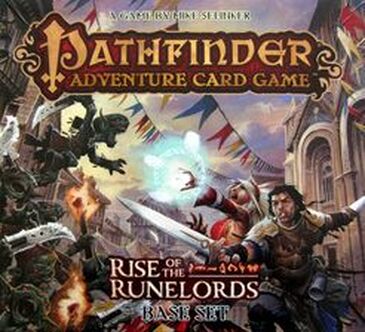 What's this game about? Pathfinder Adventure Card Game: Rise of the Runelords is an attempt to distill the experience of a roleplaying campaign into an adventure card game that doesn't need a GM. There are several characters to choose from, and each will begin with a 15-card deck that will grow and evolve over the course of multiple play sessions. You'll work through enemies and obstacles using the cards in your hand and a standard set of polyhedral dice. But be careful about burning through cards—your deck doubles as your health, so when you run out of cards, you die. Pathfinder ACG gameplay is based around location decks, which are set up at the beginning of a scenario. Each location will contain interesting loot, traps, and enemies, but you can't spend too long at any one of them. You're on a tight timer, and the object of each game is to work through location decks to locate the main bad guy, then lock those decks down to prevent him from escaping. Once he's trapped, you can defeat him for the win. How does it play solo? Since Pathfinder ACG is cooperative, you can either try to solo it with a single character or play multiple characters. (I recommend two.) Overall Thoughts I originally bought this game in my early days as a solo gamer, because it felt like everyone was recommending it. I can honestly say to you that I do not understand why. The storyline in this game is thin at best—you will often run into enemies that don't make much sense in a given location, and there isn't much flavor text to go on when you're campaigning. The main activities of the game are flipping cards and rolling dice, and all of the scenarios I have played have felt same-y. Also, you might find yourself repeating a scenario. Even the most carefully-laid plans can end in failure if a bad guy is too close to the bottom of a location deck, if the dice are against you, or both. While there are definitely some strategies you can use to more effectively pin down an enemy or confront an encounter, it doesn't feel satisfying enough to play smarter, because the gameplay is still repetitive. Besides that, character leveling is slow. So slow that you'll need to put hours into the game before your character deck develops a unique flavor. But even that doesn't change the general mechanic of flipping cards and rolling dice, so what's the point of all of those hours? It's not that Rise of the Runelords is not a functional game. It is. It's just that it's a mediocre card game that would be tolerable over the space of an hour at game night. It is not tolerable over the course of months of regular play—at least not for me. And yet, that is what all of those cards and adventure packs and slow character progressions are asking you to do. The story of this game is not epic enough, and the gameplay is not spicy enough, to support that level of commitment. In reality, Rise of the Runelords is an okay game. But I end up venting about it because its presentation is telling me that it's supposed to be an epic adventure, a worthy long-term investment. And it's not. Do I recommend it? No. Pathfinder ACG has its adherents and it is a functional game. But there are better epic games, and there are better card games. Overall Rating: 2 stars Rating scale: 5 stars — I love it! 4 stars — I really like it. 3 stars — I like it. 2 stars — It's okay. 1 star — Meh. 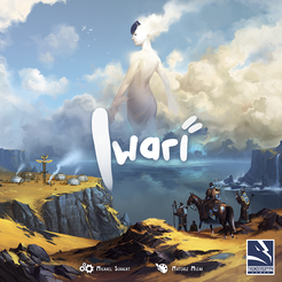 As usual, Kickstarter has some thrilling offerings for us solo gamers. Let's get right to it! 1. Iwari Iwari is an abstract (or "abstract-like," as the official copy says) game about the beginnings of humanity, when humans had not yet explored the earth or obtained the knowledge we now have. You'll use Euro game mechanics to grow and expand. The most notable thing about the game is definitely the art, which is gorgeous. If you're looking for a very pretty game to adorn your shelves, this one has promise. 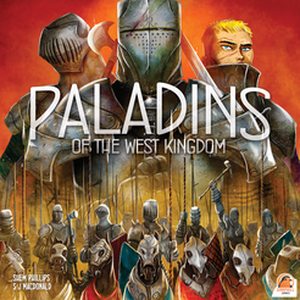 2. Paladins of the West Kingdom Paladins of the West Kingdom is a follow-up to Architects of the West Kingdom, and is the second entry into the West Kingdom trilogy. In the game, you are trying to pile up the most VP by hiring Paladin workers to carry out various tasks, including building, but also recruiting monks and dealing with outsiders. This is supposed to be a game that is relatively easy to learn, but has a lot happening with a lot of decisions to make. If you liked the North Sea series or Architects, then Paladins should be a natural next step for you. 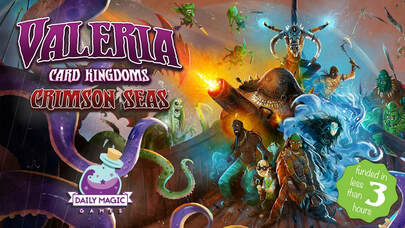 3. Valeria Card Kingdoms: Crimson Seas I don't have much experience with the Valeria series, but it continues to expand and offers a lot of options for solo play. This campaign is actually offering three different products in one Kickstarter campaign: an expansion to Valeria: Card Kingdoms, an additional expansion pack, and a standalone dice game. If you already like Valeria: Card Kingdoms and want to expand your experience, now's your chance! 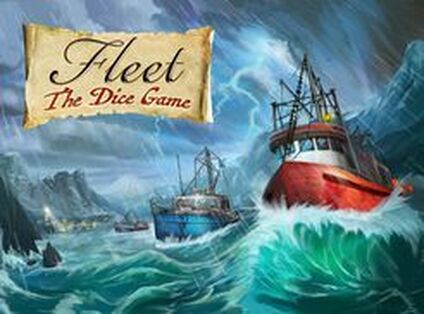 What is this game about? Fleet: The Dice Game is a roll and write version of Fleet, a card game from Eagle-Gryphon Games. Both games are all about fishing, and in Fleet: The Dice Game, you'll be rolling and drafting dice in an attempt to create a vast fishing empire. The game is played in two phases, boat and town. During the boat phase, you'll be concentrating on which types of boats and licenses to pursue. There are multiple kinds of seafood to catch (shrimp, cod, lobster, etc.), and each license type offers you a different useful bonus. On the town side of things, you can invest in the harbor or in buildings that give you further bonuses and victory points. Making money also helps you, because each coin that comes in propels you towards a wild "star" action that lets you make progress in any area you'd like. By the end of the game, you'll be having massive fishing trips, chaining multiple bonuses, and feeling like the greatest captain of the high seas. How does it play solo? Fleet: The Dice Game has a solo variant that is slightly different from two-player. You will play eight rounds instead of ten, and you'll be pitting yourself against a merciless opponent, the evil... Captain Ruth. Ruth doesn't build up an empire of her own, but she drafts dice in an attempt to destroy yours and block you off from various spaces on your score sheet. You will definitely have to think about which dice you draft in order to protect your most valuable options. The end result is a beat-your-own-score game, but one in which you're actively protecting that score agains a ruthless opponent. 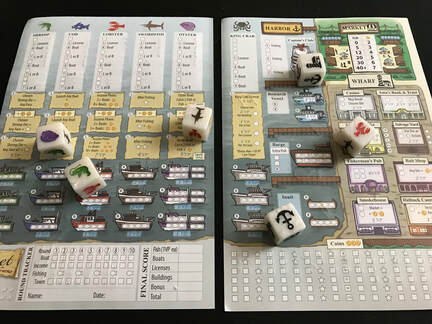 I love this game's salty dog vibe. I love this game's salty dog vibe. Overall Thoughts Fleet: The Dice Game is a very good roll and write. In fact, it's among my favorites now. I love the fishing theme, and once you have played a couple of times and learned more about your options, it's a lot of fun to choose which paths to pursue in your attempt to get a great combination of bonuses and, hopefully, a lot of victory points. (I also like that you can choose to take any die as a coin—an option that prevents "dead" rolls.) Deciding what will be the most useful to you based on the way the dice roll is good fun, especially when you're also doing a little bit of hate drafting and trying to prevent your opponent from getting what they want. My favorite thing about the solo variant is that it maintains that tension even without a human opponent, because you'll constantly be trying to keep Captain Ruth from hurting your own prospects too badly. It's a clever design that will have you cursing Captain Ruth at your kitchen table. (Yeah... that happened...) It's also one of those games that leaves you wanting more. No matter how big your fishing business has grown by the end of the game, you'll be left wishing that you could do even more—which means you'll be reaching for another score sheet and preparing to play again! There are a couple of quibbles I do have with the game. The main one is that the rulebook is not ideal. All of the information you need to play is somewhere in there... but something about the organization makes finding that information difficult. I had to reread entire sections to double check details of the game, and it was irritating the first few times I played. Now that I know the game, it's not a big deal. But expect some annoyance your first time out at sea. It doesn't help that there is a lot going on in this game. There are tons of spaces to fill in, tons of buildings to go to, and it can be a little overwhelming at the very start. You'll get your sea legs soon enough, but I wouldn't be surprised if you experienced mild annoyance during your first game or two. The fact that there is a lot going on also makes it easy to forget all of the "little rules." Every single time I play, I forget to apply a license bonus or take some kind of reward. I'm getting better about it, but be prepared for some bookkeeping. Do I recommend it? Yes. Fleet: The Dice Game is a LOT of fun, and I am honestly thinking about bringing it to work to play during my lunch break today. It's got the chaining possibilities of Ganz Schön Clever, but with the thematic flavor I need to really enjoy it. Overall Rating: 4 stars 5 stars — I love it! 4 stars — I really like it. 3 stars — I like it. 2 stars — It's okay. 1 star — Meh. 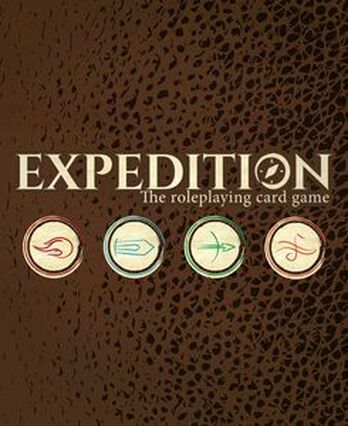 What is this game about? Expedition: The Roleplaying Card Game is designed to be a very light, easy-access RPG that will have you and your friends adventuring within minutes. It can accommodate 1–6 players, so you can roll solo like I prefer to, or you can get a pretty big party going. The only physical components you need are cards and a d20. You'll also need a tablet with the free app on it (a phone is possible, but a tablet is preferable). Each player chooses a character card, most of which are standard. There are essentially four classes: ranged, melee, magic, and music. (I remain particularly fond, however, of the "alcoholic diplomat.") None of the cards have any art on them, and you track your own and enemy health by moving clips along the sides of the cards. This game is all powered by your imagination. The app essentially runs the entire game and will teach you relevant rules when you need to know them. Mechanically, the most unique aspect of Expedition is its combat system, which gives you a limited amount of time to select a combat ability and touch the screen. (This is why a tablet is better than a phone!) If timing stresses you out, this might bother you (I frequently ignore the timer by touching the screen and THEN selecting my actions). But if you want to keep the game moving at a nice clip, it works. But Expedition's uniqueness doesn't emerge from its mechanics. Its rules are as simple as it is humanly possible for RPG rules to be. Expedition's biggest claim to fame is its crowdsourcing of questlines. There are a few "official" quests that you can start with, but after that, you'll be searching through community-produced stories and selecting your next big adventure from material that other players have written. And yes, if you feel so inspired, you can write your own! How does it play solo? Expedition has several quests that are specifically suited to solo players. If you turn the timer off, there's no reason you can't go ahead and play cooperatively as well by controlling multiple heroes. Overall Thoughts Expedition is a game that I really want to love. I wanted to love it in 2017, and I still want to. But I don't. I do want to say that I think it's great that the game has such streamlined mechanics and that it is so accessible to essentially any group of players. I love that the creators have released both horror and sci-fi expansions to extend the kinds of enemies and adventures it is possible to have within the game. I even like the idea of crowdsourcing quest material. It's cool to have an enthusiastic community that writes an endless supply of quests for everyone to enjoy. I don't even care about the lack of art—who needs it when you have your imagination? (I do, however, recommend that you sleeve your Expedition cards, because the clips you use to track health will definitely wreck them.) In the end, though, Expedition just doesn't work for me. The rules are so simplified that you really cannot get much out of the game unless the story you're playing is fantastic and fully immersive. That's where I start to have trouble. The "official" quests are delightfully quirky—as well as well-written and well-paced. But there aren't many of those. Meanwhile, the user-submitted quests remain much more of a mixed bag, and I find it unwieldy to search for new material in the app, which adds an extra layer of difficulty. (This is especially true when looking for quests designed for low player counts, and it's even more difficult if you're a solo player wanting to test run a Bard.) Some of the quests are awesome, and clearly the flowering of a vibrant community. A lot of them are okay, but just okay. Typos abound, and a lot of the story writing isn't as snappy as it could be. Which makes sense—this is something that members of the community are doing just for fun. But combined with a blah combat system, and with very simplified branching quest mechanics that don't allow for much actual role play, stories don't get a lot of boost when trying to take flight. I respect and appreciate what Expedition is trying to do, but at the end of the day, it's still too much work to find the diamonds in the rough. Do I recommend it? If you want to try something different, or maybe write a quest yourself, you might enjoy Expedition. The app is free, the game is cheap (especially if you PnP it), and the barriers to access are low. But I just can't love it the way I want to. Overall Rating: 2.5 stars Rating Scale: 5 stars — I love it! 4 stars — I really like it. 3 stars — I like it. 2 stars — It's okay. 1 star — Meh. 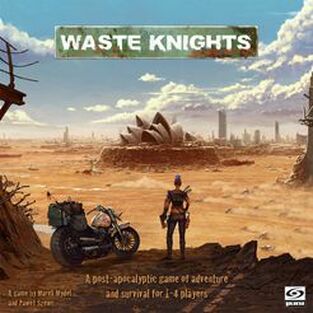 This week I want to draw your attention to a few solo-friendly Kickstarter campaigns that are ending soon! 1. Waste Knights This is the second printing of a game set in a dystopian future Australia. You can choose from multiple adventures that pit you against mutant creatures, let you drive crazy vehicles, and generally have some good, Ameritrashy fun. If you're into Mad Max, you're probably interested in the theme of this game. If it sounds good to you, check out the campaign ASAP—it ends in less than 48 hours. 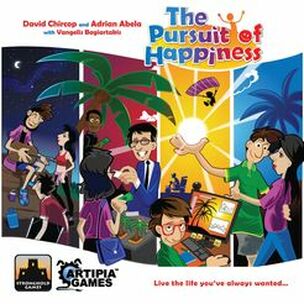 2. The Pursuit of Happiness The Pursuit of Happiness is a worker placement game from Artipia Games, and it's about living a full and happy life. The clock is ticking—how many good experiences can you cram in before you run out of time? What will you prioritize when it comes to finding the ideal job or having a satisfying family life? This reprint also comes with expansions that allow you to include experiences like travel and finding connections with your community in the life you build. Not many games have such interesting and thought-provoking themes, so this one seems very much worth a look. 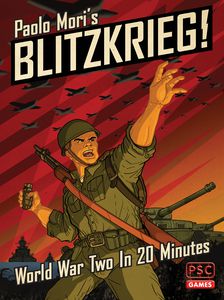 3. Blitzkrieg! Blitzkrieg, from the Plastic Soldier Company, is a two-player game designed to let you experience "World War Two In 20 minutes." However, David Turczi has signed on to create a solo mode with about nine days left in the campaign. So now we solo players have to decide: Will our general distrust of stretch goal solo modes win out? Or will the pull of the talented David Turczi win us over? With a price point of roughly $26, this one may be worth a shot. 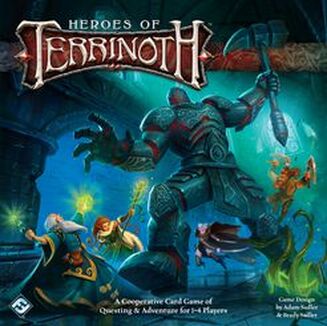 What is this game about? Heroes of Terrinoth is an adventure card game published by Fantasy Flight and designed by Adam and Brady Sadler. It is largely a reskin of their previous design, Warhammer Quest: The Adventure Card Game. In Heroes of Terrinoth, players will control adventurers who cooperate to defeat enemies and/or survive in a number of scenarios. Each scenario has its own little storyline and will play quite differently from any other one in the box. Players will have plenty of options when planning to take on a challenge. There are four different character classes, each with three different heroes to choose from. No matter what, though, each player has only four cards, each representing a different type of action. You'll do some attacking, for sure, but you also need to explore in-game locations, aid other players, and rest/heal. On a given turn, each hero may activate only one card—and that card is "exhausted" until the player does something to unexhaust it. This means that the heart of the game is choosing which actions to take at which times, ensuring that it's all done in the most advantageous order possible. Players' cards can receive upgrades throughout the game to make them more powerful, which can help fine tune the actions that are available. Even if you play the right card at the right time, however, success is not guaranteed. Actions are resolved by die rolls, and what's more, enemies that are engaged with you also roll dice to interfere with any action you take—not just attack actions! You can collect success tokens throughout the game that help you to overcome bad odds, but you'll have to budget them carefully and use them when it matters most. How does it play solo? Heroes of Terrinoth is a cooperative game, so a solo player just needs to choose two heroes and pilot both during the game. You could also play three or four heroes, if you are so inclined! It works very well this way, especially because the rules are so streamlined. 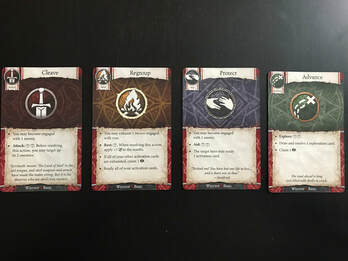 Choose your action! Choose your action! Overall Thoughts If you are like me, and you like to wring the most you possibly can out of a hand of cards, then Heroes of Terrinoth is going to be fun for you. There are a lot of scenario options in the base box, and each offers a unique challenge. The introductory scenario, "The Goblin Problem," is easy and straightforward. But the more difficult ones are no joke. You will face tough combinations of enemies, but also strange turns of events—such as getting caught in a time loop with a greedy dragon, or rushing back and forth between locations to keep them under control during a siege. I was impressed with how far the Sadler brothers were able to push this game system, which is tight and streamlined. There is almost no more fat to trim in their design, to the point where you would think it would feel repetitive. In some ways, it does—you always work with the same four actions, and you have a limited set of upgrades to choose from. The first turns of each scenario can feel especially same-y. There are moments when your limited action set, even when upgraded and tweaked, feels a little constraining. But I like a good puzzle, and I found each quest to have a completely different feel to it, even though all of them used the same "ingredients." That level of variety also gets me excited about the possibility of expansions for this game, because I think this system has plenty of room to grow. As of this moment, there is no campaign play in Heroes of Terrinoth. I would be interested to see what it would feel like to have a character who grew from game to game by getting and keeping better cards. In fact, I would like to see more thrilling upgrades to characters in general, especially for the Aid and Rest actions. Whenever you get a chance to upgrade a card, you will almost never start with an upgrade to your rest action—"rest" turns are pretty unexciting. If there are expansions to this game, I would especially like to see some better variations on taking the rest action, in particular. While some gamers hate being at the mercy of a die roll, the use of dice in Heroes of Terrinoth worked for me. I, too, hate a bad roll that prevents me from carrying out my plans. But no die roll in Terrinoth is straight-up bad. At worst, you at least roll a shield, which protects you from a point of enemy damage during your activation. Also, carefully budgeting success tokens can help you overcome a bad roll when it really counts. Do I recommend it? If you want to carefully plan out and optimize card actions, I definitely recommend it. If you are looking for a big sprawling fantasy adventure, look elsewhere. I am personally enjoying this game quite a bit. I do, however, think that Heroes of Terrinoth will need expansions to reach its full potential. Overall Rating: 3.5 stars Rating Scale: 5 stars — I love it! 4 stars — I really like it. 3 stars — I like it. 2 stars — It's okay. 1 star — Meh. |
AuthorMy name is Liz Davidson, and I play solo board games. A lot of solo board games... Archives
August 2021
Categories
All
|
 RSS Feed
RSS Feed